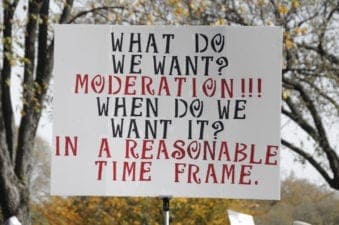Introduction:
The immediate question that may arise is “what kind of monster could be ‘against justice?’” If this were not November, I would perhaps say that this is a reasonable question and proceed to answer it in my customary way, full to overflowing with balance and nuance. But that doesn’t keep it from being, at bottom, a stupid question.

There are two kinds of justice that merit our strongest opposition. They are, respectively, justice-falsely-so-called, at any time, as we see with the social justice movement, but also real justice, biblically-defined, when someone is demanding it immediately.
Of course we should be able to instantly see why we wouldn’t want false justice at any time. We don’t want it for the same reason we don’t want people in our store buying things with counterfeit twenty dollar bills. But why would we not want real justice instantly? The answer is that—barring the events surrounding the Second Coming—if you get real justice instantly, it isn’t real justice. Justice is corrupted, not only by means of radical SJW redefinition, but it is also redefined whenever it is bustled or hurried along by sinners.
Solutions and Trade-offs:
The great Thomas Sowell put his finger on the essential difference between conservatives and progressives when he said, “There are no solutions; there are only trade-offs.” Progressives always think in terms of solutions. They see a problem, and they want it fixed instanter. “What do we want?” Justice! “When do we want it?” Now! Conservatives know that everything costs something, and so that if we take a particular course of action, it too will cost something. Is that a cost we want to pay?

This is also the difference between a reformer and a revolutionary. A revolutionary is impatient, and in that impatience, he wrecks the world. An impatient reformer is therefore a revolutionary, regardless of what he calls himself. A real reformer knows that some of the social problems we are addressing will take two hundred years to fix. Consequently, he will not be easily elected in an impatient age. Fortunately, the reforms he has in mind are not brought about by elections, but by evangelism, church planting, more evangelism, discipleship, and missions.
The apostle Paul did not arrive in Rome with a sure-fire “plan” for eliminating the gladiatorial games. He arrived with a gospel that did in fact eliminate them, but it took centuries.
A progressive on the campaign trail is someone who promises solutions—“real solutions for the hard-working American people.” A conservative is someone who knows that whatever you decide to do, there will be real costs associated with it. Sometimes those costs are worth paying, but most of the time they are not. They are especially not worth paying when no one involved in the decision-making paid the slightest bit of attention to them throughout the course of the debate. They are almost always enormous costs when they have been assiduously hidden by those who have a lust for power.
We can see how foolish this progressivist-lust-cycle is when we consider that the thing requiring “solutions” in this particular campaign is actually the bundle of problems caused by the last round of “solutions.” Whenever simple solutions are imposed, there will come a time when the bills come due. And when the bills come due, some politician is going to arise, demanding solutions to the pressing problem of these “bills” that are mysteriously “due.” So he proposes a sweeping Reform Bill. What problems will it solve? It will solve all the problems created by the last Reform Bill, the one proposed by the previous senator from the great state of Minnesostastan.
Patience Is Hard:
One of the things I periodically say in the course of pastoral counseling is something like this: “Remember that there is no problem so bad but that you cannot make it worse.” But I try to say it encouragingly, and with a smile.

If this is true on the lives of individuals, and in marriages and in families, as it most certainly is, then how much more is it the case when we are talking about societies with millions of people in them. What are the ways in which we might make things worse? How might all this go wrong? Conservatives ask these sorts of questions, and progressives do not. And when conservatives stop asking them, this is the surest indicator that they have begun the long march leftward.
Pick a social problem, any social problem, from any point in history. A caravan moving toward the southern border. All-white restaurants refusing service to blacks. Widespread groping in the movie industry. Gladiatorial games in honor of Vespasian. Inheritance laws that require everything going to the first born son. Communist spies throughout the State Department in the 1950s. Abortion on demand in post-Roe America.
Now here’s the problem. I want you to craft a “solution” to any one of those problems, and I want you to do so with the proviso that ten years after your solution is implemented, whatever mechanism you came up with will be taken over and used by the enemies of God.
The American Founders devised just such a system. They wanted a form of government that they would be willing to live under if their worst enemies won the next three elections in a row.
This is nothing other than the Golden Rule applied to practical politics. Give the CIA precisely the amount of power you would want them to have if Hillary Clinton had won the election.
Is that one too easy? Okay, so let’s make you a hard one.
Say we are confronted with a problem of racist B & Bs. Such Bed and Breakfast joints reserve the right to refuse service to anyone which, in this hypothetical situation, would mean anyone with darker skin than theirs. Okay, that’s your problem. Now I want you to craft legislation that deals with such discrimination, and do so with the knowledge that ten years after the passage of your legislation, the machinery you have created (if indeed you were foolish enough to create some) will be taken over by the homosexual lobby.
So am I saying that the Civil Rights Act of 1964 was not thought through carefully? That is exactly what I am saying. The fact that you have the moral high ground when it comes to all the intended consequences does not protect you in the slightest from all the unforeseen unintended consequences. And—incidentally—your facile ability to accuse me of racism because I care about unintended consequences is one of the more egregious unintended consequences.
Leftward, Ho:
We are living in a time when multiple evangelical organizations—denominations, publishers, parachurch organizations, etc.—are steadily moving left. Hardly any are moving in a genuinely conservative direction. In some cases the problem is open and flagrant, while in others it is simply a worrisome possibility.
But regardless of who you are worried about—the SBC, the PCA, American Vision, InterVarsity, The Gospel Coalition, you name it—do not settle for fig leaf affirmations, as though that settles anything. “They still have inerrancy in their statement of faith.” And don’t look for whether they believe in “cultural engagement.” Cultural engagement is frequently the code mantra that is being chanted in the course of cultural surrender. Real cultural engagement is conservative, slow, reformational. Spurious cultural engagement is hot and impatient.
So listen for them echoing the world’s refrain. Take note of that spirit of impatience—particularly impatience with conservatives. Whenever someone wants to read the fine print, when someone wants to examine the price tag and gets out his calculator, and everybody starts yelling at him and his racist math, you have identified the problem.
So regardless of what they say, it is not possible for sound Christians to believe in “solutions.”
I Was Told There Would Be Free Books:
The free book today is Standing on the Promises. I originally wrote this book when I was still baptistic in my theology, and I wrote it together with what is now To a Thousand Generations, my argument for paedobaptism. And so yes, I wrote most of that argument for paedobaptism while I was still baptistic—I wanted to read something that addressed the actual questions I had. Initially,as I say, it was all one book together with Standing on the Promises, and someone suggested we split them into two so that the “parenting part” not be combined with parts that would be off-putting to godly baptistic parents.
What is the tie-in to the post today? The tie-in is this. The most reformational thing we can do, with our eyes on generational faithfulness, is bringing up our children in the nurture and admonition of the Lord. It ties into everything.

